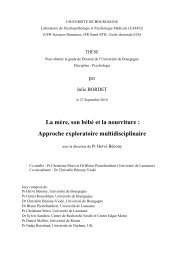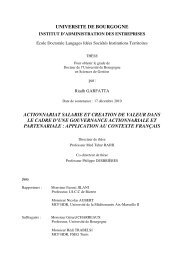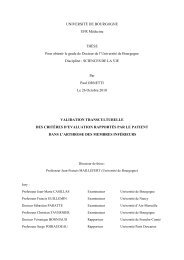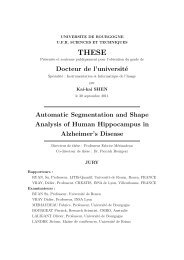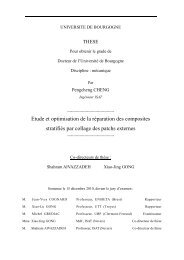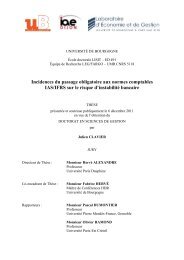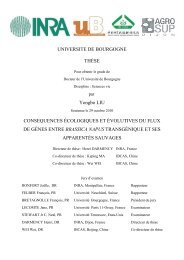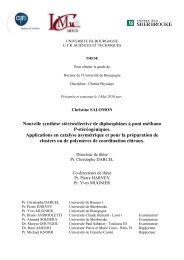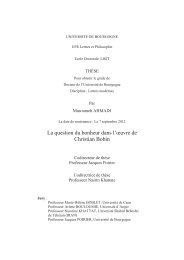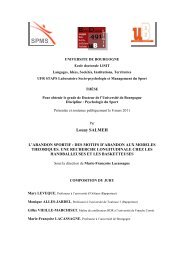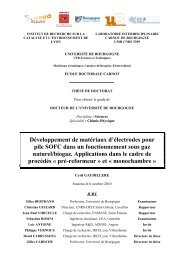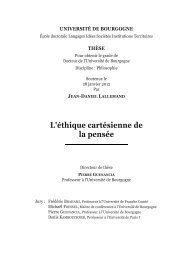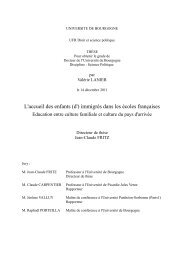Higher education in Asian countries and the role of international ...
Higher education in Asian countries and the role of international ...
Higher education in Asian countries and the role of international ...
Create successful ePaper yourself
Turn your PDF publications into a flip-book with our unique Google optimized e-Paper software.
251<br />
development <strong>of</strong> human capital, which is prerequisite for <strong>the</strong> development <strong>of</strong> all o<strong>the</strong>r resources.<br />
Like o<strong>the</strong>r parts <strong>of</strong> <strong>the</strong> world, <strong>in</strong> many less developed <strong>Asian</strong> <strong>countries</strong> acquisition <strong>and</strong> utilization<br />
<strong>of</strong> modern knowledge for <strong>the</strong> development <strong>of</strong> national capacities <strong>and</strong> capabilities rema<strong>in</strong>s low on<br />
government agendas, which is evident from <strong>the</strong> absence <strong>of</strong> clear policies <strong>and</strong> political regard<strong>in</strong>g<br />
<strong>the</strong> importance <strong>of</strong> knowledge <strong>and</strong> its implication for susta<strong>in</strong>able development <strong>and</strong> <strong>the</strong> overall<br />
transformation <strong>of</strong> societies (Haddad, 2005). At <strong>the</strong> sometime a shift <strong>in</strong> Asia is also evident as <strong>in</strong><br />
some <strong>countries</strong>, that are also emerg<strong>in</strong>g economies, now higher <strong>education</strong> is regarded as more<br />
than mere learn<strong>in</strong>g, due to this new shift <strong>in</strong> <strong>the</strong> <strong>role</strong> <strong>of</strong> <strong>education</strong>, today it is regarded as an<br />
<strong>in</strong>vestment.<br />
The rapid expansion <strong>and</strong> growth <strong>of</strong> higher <strong>education</strong> has given birth to paradox <strong>of</strong> decl<strong>in</strong><strong>in</strong>g<br />
expenditure; <strong>in</strong> most <strong>of</strong> <strong>the</strong> <strong>countries</strong> <strong>of</strong> <strong>the</strong> region, per student expenditure is cont<strong>in</strong>uously<br />
decreas<strong>in</strong>g for <strong>the</strong> last two decades because <strong>the</strong> <strong>in</strong>crease <strong>in</strong> budget for higher <strong>education</strong> does not<br />
co<strong>in</strong>cide with <strong>the</strong> <strong>in</strong>crease <strong>in</strong> student enrolment. Although low <strong>in</strong>come <strong>countries</strong> have <strong>in</strong>creased<br />
<strong>the</strong> share <strong>of</strong> national <strong>in</strong>come spent on <strong>education</strong> from 2.9% to 3.8% s<strong>in</strong>ce 1999 but still some<br />
regions <strong>and</strong> <strong>countries</strong> are cont<strong>in</strong>ued to neglect <strong>education</strong>. Among world regions, Central Asia<br />
<strong>and</strong> South <strong>and</strong> West Asia <strong>in</strong>vest <strong>the</strong> least <strong>in</strong> <strong>education</strong> (UNESCO, 2011). This has raised <strong>the</strong><br />
dem<strong>and</strong> <strong>and</strong> need to enhance <strong>in</strong>ternal <strong>and</strong> external efficiency, adopt<strong>in</strong>g cost effective methods <strong>of</strong><br />
management <strong>and</strong> teach<strong>in</strong>g at higher <strong>education</strong> <strong>in</strong>stitutions. In this context <strong>in</strong> those <strong>countries</strong><br />
where budget for was already too little to meet <strong>the</strong> dem<strong>and</strong>s <strong>of</strong> higher <strong>education</strong> <strong>the</strong>re higher<br />
<strong>education</strong> <strong>in</strong>stitutions are fac<strong>in</strong>g a hard time to face <strong>the</strong> challenge <strong>of</strong> expansion <strong>and</strong> growth what<br />
to speak <strong>of</strong> quality. Consequently <strong>in</strong> such <strong>countries</strong> a majority <strong>of</strong> higher <strong>education</strong> <strong>in</strong>stitution<br />
focus<strong>in</strong>g quantity <strong>and</strong> thus <strong>the</strong> quality rema<strong>in</strong> questionable.<br />
7.2 IGOs <strong>role</strong> <strong>and</strong> reason <strong>of</strong> existence<br />
Realists, liberals, <strong>and</strong> o<strong>the</strong>rs schools have long debated <strong>the</strong> utility <strong>of</strong> IGOs <strong>and</strong> a majority accepts<br />
that IGOs have some <strong>role</strong> to play <strong>in</strong> <strong>the</strong> society but <strong>the</strong>re exist no consensus on what extent IGOs<br />
can/ should <strong>in</strong>fluence at national <strong>and</strong> <strong>in</strong>ternational levels (Boehmer, Gartzke, & Nordstrom,<br />
2004). Functionalists argue that IGOs are capable <strong>of</strong> transform<strong>in</strong>g state preferences <strong>and</strong><br />
promot<strong>in</strong>g pacific global relations. Realists, by contrast ma<strong>in</strong>ta<strong>in</strong> that IGOs reflect, ra<strong>the</strong>r than<br />
effect, world politics (Boehmer, Gartzke, & Nordstrom, 2004). Realists take IGOs as self-<br />
centered tool that serve self <strong>in</strong>terests <strong>of</strong> <strong>the</strong> powerful states to implement <strong>the</strong>ir own power



